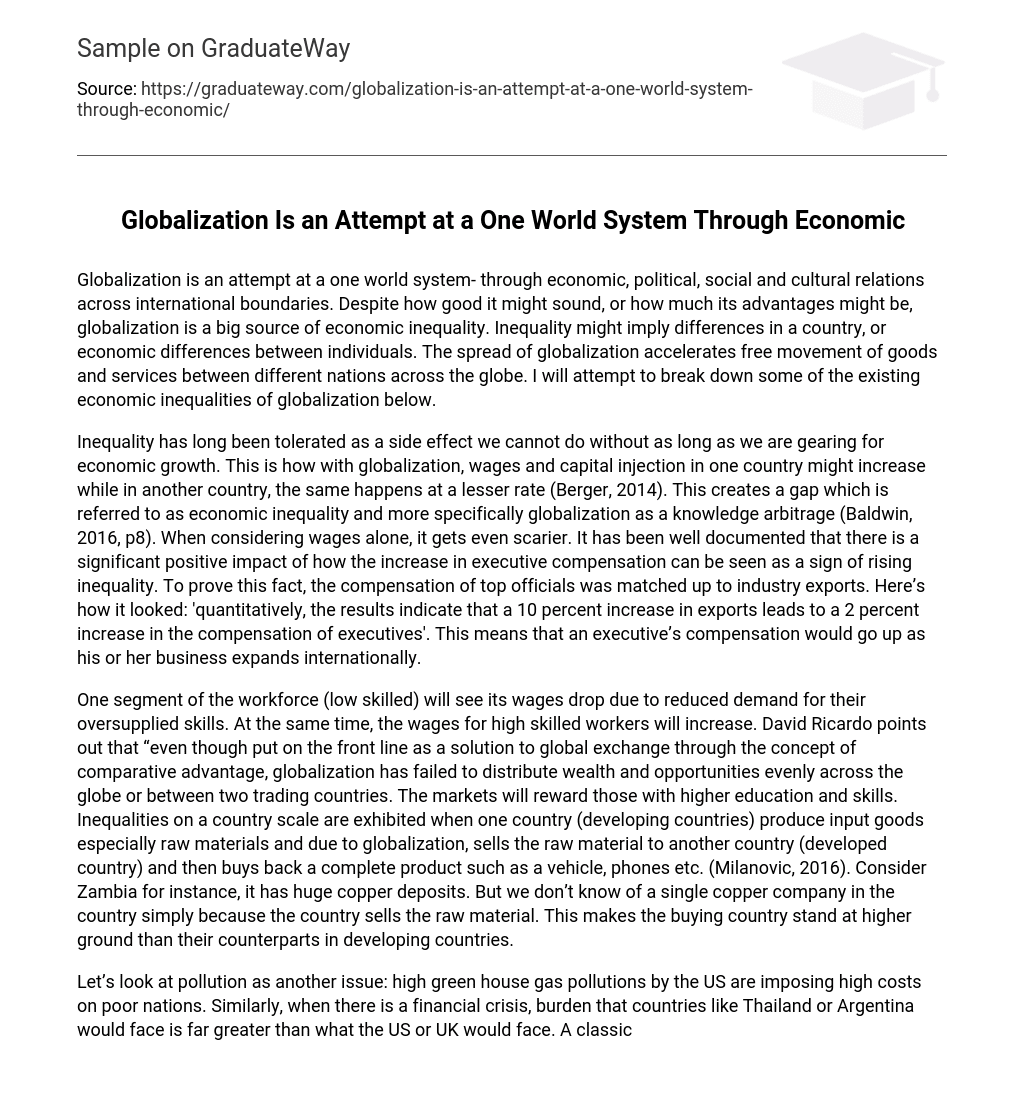Globalization is an attempt at a one world system- through economic, political, social and cultural relations across international boundaries. Despite how good it might sound, or how much its advantages might be, globalization is a big source of economic inequality. Inequality might imply differences in a country, or economic differences between individuals. The spread of globalization accelerates free movement of goods and services between different nations across the globe. I will attempt to break down some of the existing economic inequalities of globalization below.
Inequality has long been tolerated as a side effect we cannot do without as long as we are gearing for economic growth. This is how with globalization, wages and capital injection in one country might increase while in another country, the same happens at a lesser rate (Berger, 2014). This creates a gap which is referred to as economic inequality and more specifically globalization as a knowledge arbitrage (Baldwin, 2016, p8). When considering wages alone, it gets even scarier. It has been well documented that there is a significant positive impact of how the increase in executive compensation can be seen as a sign of rising inequality. To prove this fact, the compensation of top officials was matched up to industry exports. Here’s how it looked: ‘quantitatively, the results indicate that a 10 percent increase in exports leads to a 2 percent increase in the compensation of executives’. This means that an executive’s compensation would go up as his or her business expands internationally.
One segment of the workforce (low skilled) will see its wages drop due to reduced demand for their oversupplied skills. At the same time, the wages for high skilled workers will increase. David Ricardo points out that “even though put on the front line as a solution to global exchange through the concept of comparative advantage, globalization has failed to distribute wealth and opportunities evenly across the globe or between two trading countries. The markets will reward those with higher education and skills. Inequalities on a country scale are exhibited when one country (developing countries) produce input goods especially raw materials and due to globalization, sells the raw material to another country (developed country) and then buys back a complete product such as a vehicle, phones etc. (Milanovic, 2016). Consider Zambia for instance, it has huge copper deposits. But we don’t know of a single copper company in the country simply because the country sells the raw material. This makes the buying country stand at higher ground than their counterparts in developing countries.
Let’s look at pollution as another issue: high green house gas pollutions by the US are imposing high costs on poor nations. Similarly, when there is a financial crisis, burden that countries like Thailand or Argentina would face is far greater than what the US or UK would face. A classic case is in 1995, the recession in Mexico caused the poor to take their kids out of school and many of them did not return.
In conclusion, the gap between the poor and the rich is widening each day and it is not just between individuals, but also between countries (Giddens, 2018). In developed countries, inequality can be positively identified as a means to motivate people. When the same happens to poor countries, inequality breaks the camel’s back. Globalization “sets off a race to the bottom with nations converging toward the lowest levels of corporate taxation, financial regulations, or environmental, labor and consumer protections”. Therefore we need a complete rebirth- increase educational opportunities and build sound institutions for poor countries. We need global regulatory arrangements and mechanisms to manage the global environment- like the Kyoto accord and more, help emerging markets cope with global financial crises and implement strategies in tackling and discouraging corruption especially in developing countries
External Resources:
- Global Policy Forum:https://www.globalpolicy.org/component/content/article/218-injustice-and-inequality/46552.html
- US NEWS Study: ‘Globalization Has Boosted Income Inequality’- by Andrew Soergel
- https://www.usnews.com/news/articles/2017-05-08/globalization-boosted-income-inequality-study-says
- Berger, N. (2014, June 23). Theorist Eric Maskin: Globalization Is Increasing Inequality. Retrieved from World Bank: http://www.worldbank.org/en/news/feature/2014/06/23/theorist-eric-maskin-globalization-is-increasing-inequality
- Giddens, A. (2018). Globalization. In Sociology of Globalization (pp. 19-26). Routledge.
- Milanovic, B. (2016). Global inequality: A new approach for the age of globalization. Harvard University Press





